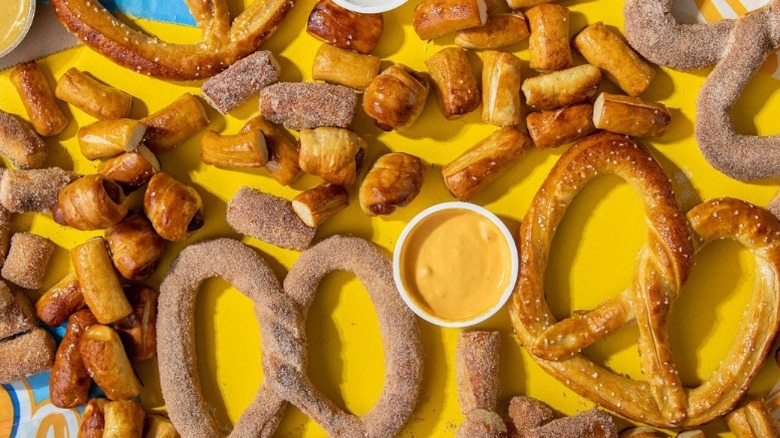The Failure Of Auntie Anne's Heart-Healthy Pretzel
It's always interesting to see fast food or snack companies try to advertise "healthy" things. In theory, the practice sounds good: You can still enjoy food from this particular restaurant or brand without worrying that you're eating yourself to an early grave. But the problem isn't that people don't want to be healthy, it's that it's just an odd contrast to see a company known for salty, greasy, buttery foods to suddenly be promoting "heart health" or "low-calorie options."
Take, for example, Burger King's "Satisfries" experiment back in 2013. The basic idea behind the Satisfries was that these were a "healthy" upgrade to the chain's average fries, since they absorbed less oil than their counterparts. The Motley Fool explains that customers didn't exactly jump on the idea of "healthy french fries," especially considering that these Satisfries were more expensive than the normal fries. McDonald's tried to market the McLean Deluxe back in 1991, a burger that was supposedly "91% fat-free." The War Eagle Reader, looking back on the burger, reported that it was described as being dryer than the usual burger, had too different of a burger mouthfeel, and was just too expensive for the average customer. In short, "healthy" and junk food aren't exactly the best things that go together.
But what if a smaller company, such as Auntie Anne's, tried to focus on promoting health? Could a healthy pretzel be enough to change people's minds about snack foods and health?
No one wanted Auntie Anne's heart-healthy pretzel
In all fairness, pretzels can be healthy for you — in certain aspects, of course. While eating something that's basically bread covered in salt may not be healthy for you heart-wise, SF Gate tells us that a pretzel is a decent low-fat snack. Perhaps Auntie Anne's reasoned that, if they could make a pretzel both low in fat and heart-healthy, then they would have surely created the perfect snack food.
According to HuffPost, the famed pretzel company released what it called the "Honey Whole Grain Pretzel" in 2013. Created after a long period of research, this pretzel consisted of 300 calories, 6 grams of fiber, and 11 grams of protein. Food Business News reports that Auntie Anne's corporate seemed to expect that this sweet, honey-flavored, grain-filled pretzel would be enough to lure consumers to its outlets in search of a pretzel that not only contained the delicious Auntie Anne's flavor they knew and loved, but one that would be better for them.
But why, then, did the pretzel fail? Perhaps, The Huffington Post reasons, customers didn't really want a pretzel that was made of whole grains and low in calories. What the people wanted was a classic Auntie Anne's pretzel – buttery, chewy, salty, golden brown on the outside, and soft on the inside. Sure, it may not have been "healthy," per se, but why ruin a good pretzel?
Auntie Anne's may have been thinking heart-healthy, but consumers thought with their stomachs.

